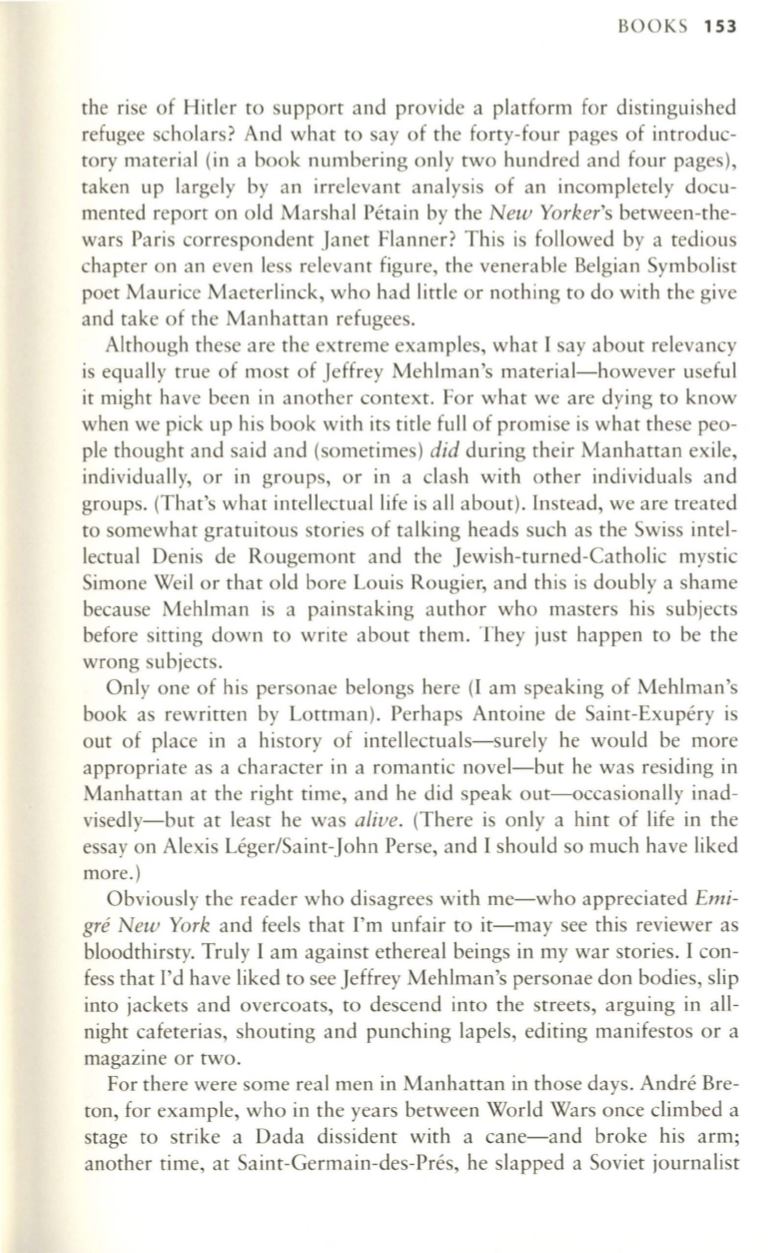
BOOKS
1S3
the rise of Hitler to support and provide a platform for distinguished
refugee scholars? And what to say of the forty-four pages of introduc–
tory material (in a book numbering only two hundred and four pages),
taken up largely by an irrelevant analysis of an incompletely docu–
mented report on old Marshal Petain by the
New Yorker's
between-the–
wars Paris correspondent Janet Flanner? This is followed by a tedious
chapter on an even less relevant figure, the venerable Belgian Symbolist
poet Maurice Maeterlinck, who had little or nothing to do with the give
and take of the Manhattan refugees.
Although these are the extreme examples, what 1 say about relevancy
is equally true of most of Jeffrey Mehlman's material-however useful
it might have been in another context. For what we are dying to know
when we pick up his book with its title full of promise is what these peo–
ple thought and said and (sometimes)
did
during their Manhattan exile,
individually, or in groups, or in a clash with other individuals and
groups. (That's what intellectual life is all about). Instead, we are treated
to somewhat gratuitous stories of talking heads such as the Swiss intel–
lectual Denis de Rougemont and the Jewish-turned-Catholic mystic
Simone Weil or that old bore Louis Rougier, and this is doubly a shame
because Mehlman is a painstaking author who masters his subjects
before sitting down to write about them. They just happen to be the
wrong subjects.
Only one of his personae belongs here (1 am speaking of Mehlman's
book as rewritten by Lottman). Perhaps Antoine de Saint-Exupery is
out of place in a history of intellectuals-surely he would be more
appropriate as a character in a romantic novel-but he was residing in
Manhattan at the right time, and he did speak out-occasionally inad–
visedly-but at least he was
alive.
(There is only a hint of life in the
essay on Alexis Leger/Saint-John Perse, and 1 should so much have liked
more.)
Obviously the reader who disagrees with me-who appreciated
Emi–
gre New York
and feels that I'm unfair to it-may see this reviewer as
bloodthirsty. Truly 1 am against ethereal beings in my war stories. I con–
fess that I'd have liked to see Jeffrey Mehlman's personae don bodies, slip
into jackets and overcoats, to descend into the streets, arguing in all–
night cafeterias, shouting and punching lapels, editing manifestos or a
magazine or two.
For there were some real men in Manhattan in those days. Andre Bre–
ton, for example, who in the years between World Wars once climbed a
stage to strike a Dada dissident with a cane-and broke his arm;
another time, at Saint-Germain-des-Pres, he slapped a Soviet journalist


